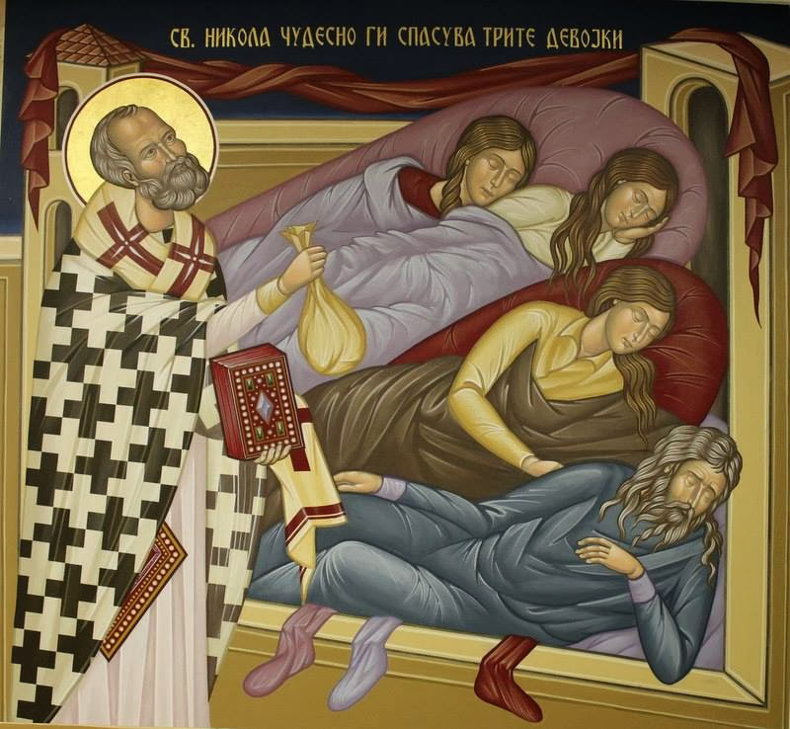I'm seeing so many posters and cartoons about Santa Claus this time of year, I thought I'd share one story.
I'm reading Bill Bennett's "Tried by Fire" which is about the first 1000 years of Christianity. It's a bit slow going, and I'm only on p. 112 (got it several months ago). If you're familiar with the Christian church, you'll remember from the letters of Paul and Peter to the young churches (the New Testament) that they began squabbling almost immediately. Fast forward to the 4th century and the struggle between the supporters of Arius and the rest of the faithful.
When the Christians were no longer persecuted by the emperor, and could worship without fear, things just got worse. So Constantine told them to behave, and they ignored him. Then he decided to call all the bishops together from all over world to come to Constantinople and work things out face to face. That's quite a trek from Spain and India and Egypt, so about 300 out of 1800 bishops made it. Neither of the two big stars of the squabble were there, Arius and Athanasius, but after the bishops decided to write up a document detailing their theological position, what we call Christianity today won, and we recite this in our churches--The Nicene Creed. The date was June 19, AD 325. Arius was banished, but his heresy lived on for several generations. It pops up from time to time. Dan Brown (The Da Vinci Code) most recently tried to foist it on a gullible public. The church had always taught and believed that Jesus was God, but now it was decided by an official council of bishops and was in writing.
I'm reading Bill Bennett's "Tried by Fire" which is about the first 1000 years of Christianity. It's a bit slow going, and I'm only on p. 112 (got it several months ago). If you're familiar with the Christian church, you'll remember from the letters of Paul and Peter to the young churches (the New Testament) that they began squabbling almost immediately. Fast forward to the 4th century and the struggle between the supporters of Arius and the rest of the faithful.
When the Christians were no longer persecuted by the emperor, and could worship without fear, things just got worse. So Constantine told them to behave, and they ignored him. Then he decided to call all the bishops together from all over world to come to Constantinople and work things out face to face. That's quite a trek from Spain and India and Egypt, so about 300 out of 1800 bishops made it. Neither of the two big stars of the squabble were there, Arius and Athanasius, but after the bishops decided to write up a document detailing their theological position, what we call Christianity today won, and we recite this in our churches--The Nicene Creed. The date was June 19, AD 325. Arius was banished, but his heresy lived on for several generations. It pops up from time to time. Dan Brown (The Da Vinci Code) most recently tried to foist it on a gullible public. The church had always taught and believed that Jesus was God, but now it was decided by an official council of bishops and was in writing.
Skipping lots of names and stories here. . . "Another attendee was the bishop Nicholas of Myra. Nicolas had a reputation for generosity, such as putting coins in shoes that were left out for him. His life and works became the basis for our modern conception of Santa Claus. Unlike the image of Santa as a red and rosy-faced man [I think that was Coca Cola marketing] a forensic survey of Nicholas's bones in 2004 revealed that the real Saint Nicholas was around 5.5' tall had suffered a broken nose, and probably had a slight frame. The composition of Nicholas's bones also suggested that he may have spent a good deal of time in dank prisons, perhaps while suffering in the persecutions of the early fourth century."

https://www.youtube.com/watch?v=WHd79-XUFGQ

Christianity gets in trouble when it prospers, not when it is persecuted, according to Bennett.

https://www.youtube.com/watch?v=WHd79-XUFGQ
Christianity gets in trouble when it prospers, not when it is persecuted, according to Bennett.






No comments:
Post a Comment